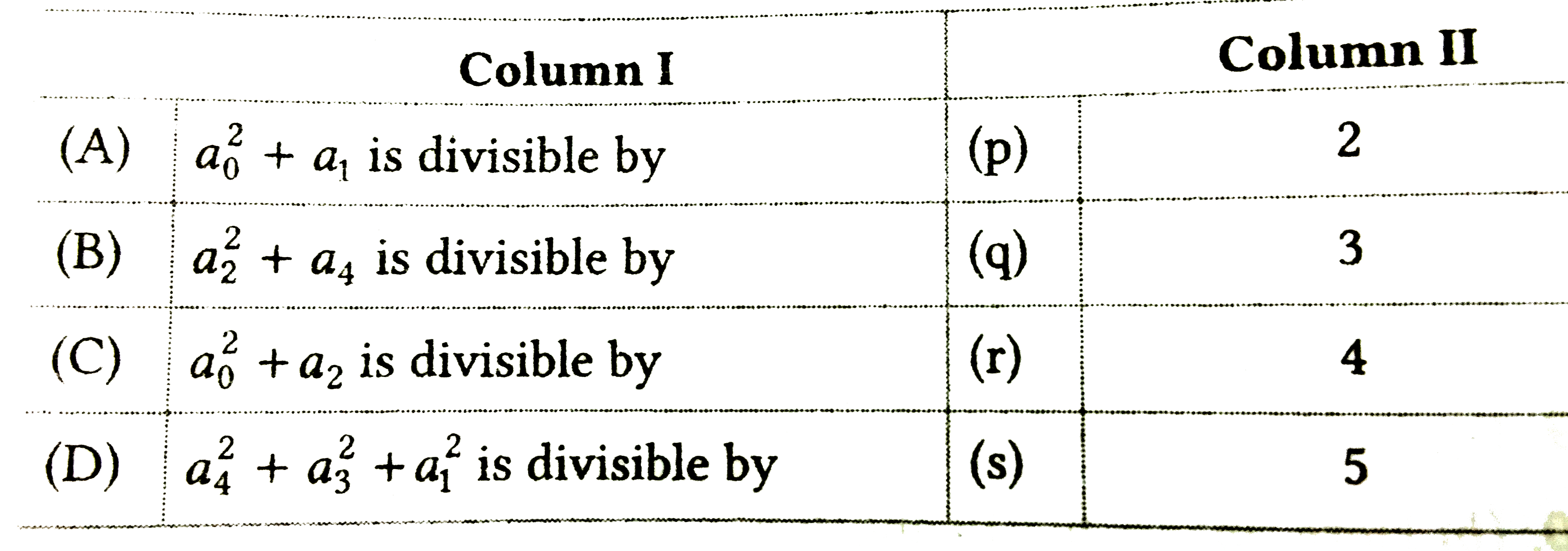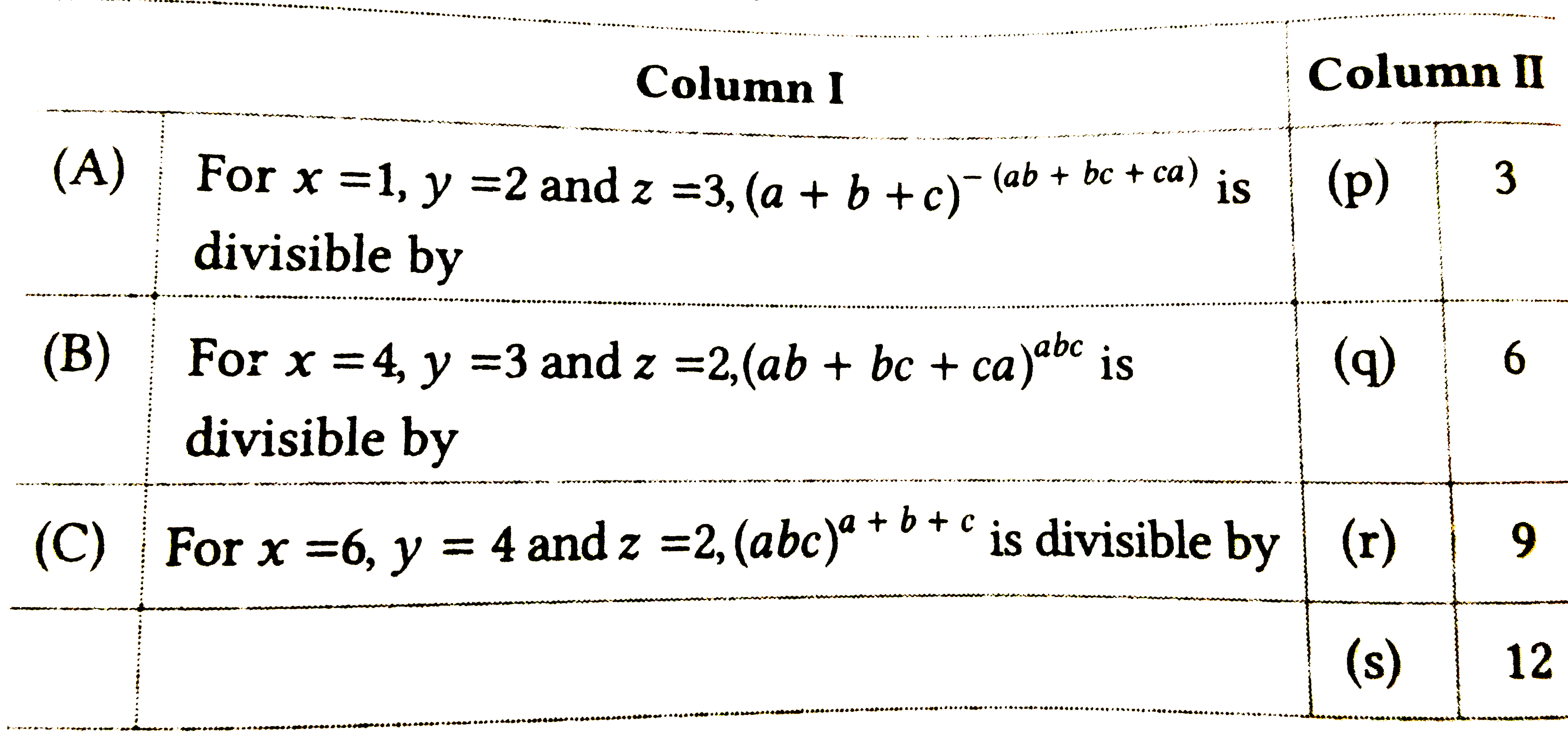Complete Solutions to Examples of chapter DETERMINANTS of Class 12 book with complete answers and questions
| Class 12 | MATHS |
| Chapter | DETERMINANTS |
| ARIHANT MATHS | Examples |
| Number Of Questions | 75 |
| Academic Year | 2023-24 |
Find the value of the determinant
`|{:(1,2,4),(3,4,9),(2,-1,6):}|`02:40View SolutionIf `Delta=|{:(1,sintheta,1),(-sintheta,1,sintheta),(-1,-sintheta,1):}|"prove that" 2lt=Deltalt=4.`
03:04View SolutionExpand `|{:(3,2,5),(9,-1,4),(2,3,-5):}|` by Sarrus rule.
02:45View SolutionIf a,b,c,`in` R, find the number of real root of the equation `|{:(x,c,-b),(-c,x,a),(b,-a,x):}|`=0
02:23View SolutionExpand `|{:(1,2,3),(4,6,2),(5,9,4):}|`
01:18View SolutionFind the value of the determinant
`|{:(-1,2,1),(3+2sqrt(2),2+2sqrt(2),1),(3-2sqrt(2),2-2sqrt(2),1):}|`02:14View SolutionFind the determinants of minors and cofactors of the determinant `|{:(2,3,4),(7,2,-5),(8,-1,3):}|`
05:35View SolutionFind the determinants of minors of the determinant `|{:(1,2,3),(-4,3,6),(2,-7,9):}|`
02:50View SolutionIf the value of a third order determinant is 11, find the value of the square of the determinat formed by the cofactors.
02:20View SolutionEvaluate `|{:(13,16,19),(14,17,20),(15,18,21):}|`.
02:15View SolutionProve that `|{:(alpha,beta,gamma),(theta,phi,psi),(lambda,mu,nu):}|=|{:(beta,mu,phi),(alpha,lambda,theta),(gamma,nu,psi):}|.`
02:48View SolutionUse the properties of determinant and without expanding prove that `|{:(b+c,q+r,y+z),(c+a,r+p,z+x),(a+b,p+q,x+y):}| = 2 |{:(a,p,x),(b,q,y),(c,r,z):}|`.
03:03View SolutionWithout expanding as far as possible, prove that `|{:(1,1,1),(x,y,z),(x^(3),y^(3),z^(3)):}|`=`(x-y)(y-z)(z-x)(x+y+z)`.
04:38View SolutionSolve for x,
`|{:(4x,6x+2,8x+1),(6x+2,9x+3,12x),(8x+1,12x,16x+2):}|`=004:22View SolutionProve that
`|{:(a^(2)+1,ab,ac),(ab,b^(2)+1,bc),(ac,bc,c^(2)+1):}|=1+a^(2)+b^(2)+c^(2)`.04:20View SolutionIf a,b, and c are all different and if
`|{:(a,a^(2),1+a^(3)),(b,b^(2),1+b^(3)),(c,c^(2),1+c^(3)):}|`=0 Prove that abc =-1.02:52View SolutionThe largest value of a third order determinant whose elements are equal to `1 or 0` is
04:05View SolutionFind the largest value of a third order determinant whose elements are 0 or -1.
05:26View SolutionShow that the value of a third order determinant whose all elements are 1 or -1 is an even number.
04:44View SolutionEvaluate `|[1,2,3],[-2,3,2],[3,4,-4]|xx|[-2,1,3],[3,-2,1],[2,1,-2]|`. Using the concept of multiplication of determinants.
04:25View SolutionIf `a x1 2+b y1 2+c z1 2=a x2 2+b y2 2+c z2 2=a x3 2+b y3 2+c z3 2=d ,a x2 3+b y_2y_3+c z_2z_3=a x_3x_1+b y_3y_1+c z_3z_1=a x_1x_2+b y_1y_2+c z_1z_2=f,` then prove that `|x_1y_1z_1x_2y_2z_2x_3y_3z_3|=(d-f){((d+2f))/(a b c)}^(1//2)`
09:18View SolutionProve that `|{:(a_(1)alpha_(1)+b_(1)beta_(1),a_(1)alpha_(2)+b_(1)beta_(2),a_(1)alpha_(3)+b_(1)beta_(3)),(a_(2)alpha_(1)+b_(2)beta_(1),a_(2)alpha_(2)+b_(2)beta_(2),a_(2)alpha_(3)+b_(2)beta_(3)),(a_(3)alpha_(1)+b_(3)beta_(1),a_(3)alpha_(2)+b_(3)beta_(2),a_(3)alpha_(3)+b_(3)beta_(3)):}|`=0.
01:57View SolutionProve that `|{:(2,alpha+beta+gamma+delta,alphabeta +gammadelta),(alpha+beta+gamma+delta,2(alpha+beta)(gamma+delta),alphabeta(gamma+delta)+gammadelta(alpha+beta)),(alphabeta+gammadelta,alphabeta(gamma+delta)+gammadelta(alpha+beta),2alphabetagamma delta):}|`=0
05:43View SolutionProve that
`|{:(cos(A-P),cos(A-Q),cos(A-R)),(cos(B-P),cos(B-Q),cos(B-R)),(cos(C-P),cos(C-Q),cos(C-R)):}|`=0.06:22View SolutionIf `alpha,beta "and" gamma` are real number without expanding at any stage prove that
`|{:(1,cos(beta-alpha),cos(gamma-alpha)),(cos(alpha-beta),1,cos(gamma-beta)),(cos(alpha-gamma),cos(beta-gamma),1):}|`=0.07:14View SolutionSolve the following system of equation by Cramer's rule.
x+y=4 and 3x-2y=901:42View SolutionSolve the following system of equation by Cramer's rule.
x+y+z=9
2x+5y+7z=52
2x+y-z=003:00View SolutionFor what values of p and q the system od equations
x+y+z=6
x+2y+3z=10
x+2y+pz=q has
(i) unique sollution ?
(ii) an infinitely many solutions ?
(iii) no solution ?09:46View SolutionIf the following equations `x+y-3 = 0, (1+lamda)x + (2+lamda) y - 8 = 0, x-(1+lamda)y + (2+lamda) = 0` are consistent then the value of `lamda` is
07:54View SolutionFind all values of `lambda` for which the `(lambda-1)x+(3lambda+1)y+2lambdaz=0(lambda-1)x+(4lambda-2)y+(lambda+3)z=0 2x+(3lambda+1)y+3(lambda-1)z=0` possess non-trivial solution and find the ratios `x:y:z,` where `lambda` has the smallest of these value.
09:04View SolutionGiven x=cy+bz,y=az+cx and z=bx+ay, then prove `a^(2) +b^(2) +c^(2) `+2abc =1.
02:37View SolutionIf f(x) =`|{:(sinx,cosx,sinx),(cosx,-sinx,cosx),(x,1,1):}|` find the value of `2(f'(o))+{f'(1)}^(2)`
02:56View SolutionLet f(x)=`|{:(cosx,sinx,cosx),(cos2x,sin2x,2cos2x),(cos3x,sin3x,3cos3x):}|` then find the value of `f'((pi)/(2))`.
06:19View SolutionLet `alpha` be a repeated root of a quadratic equation `f(x)=0a n dA(x),B(x),C(x)` be polynomials of degrees 3, 4, and 5, respectively, then show that `|A(x)B(x)C(x)A(alpha)B(alpha)C(alpha)A '(alpha)B '(alpha)C '(alpha)|` is divisible by `f(x)` , where prime `(')` denotes the derivatives.
09:58View SolutionIf `(x)=|alpha+xtheta+xlambda+xbeta+xvarphi+xmu+xgamma+xpsi+x v+x|` show that `"Delta^"(x)=0a n d"Delta"(0)+S x ,w h e r eS` denotes he sum of all the cofactors of all elements in `"Delta"(0)a n d` dash denotes the derivative with respect of `xdot`
04:31View SolutionIf `f(x)=|{:(x^(n),sinx,cosx),(n!,"sin"(npi)/(2),"cos"(npi)/(2)),(a,a^(2),a^(3)):}|`, then the value of `(d^(n))/(dx^(n))(f(x))" at "x=0" for "n=2m+1` is
06:18View SolutionIf `Delta(x)=|{:(a,b,c),(6,4,3),(x,x^(2),x^(3)):}|` then find `int_(0)^(1) Delta (x)`dx.
03:34View SolutionLet f(x) = `|{:(secx,cosx,sec^(2)x+cotx cosecx),(cos^(2)x,cos^(2)x,cosec^(2)x),(1,cos^(2)x,cos^(2)x):}|` then find the value of `f_(0)^(pi//2)` f(x) dx.
16:28View SolutionIf for any +ve integer n `Delta_n=[[2r-1, ^nC_r,1] ,[n^2-1,2^n,n+1], [cos^2(n^2) ,cos^2(n) ,cos^2(n+1)]]` then `sum_(r=0)^nDelta_r, n in N`, is equal to
04:47View SolutionLet n be a positive integer and
`Delta_(r)=|{:(r^(2)+r,r+1,r-2),(2r^(2)+3r-1,3r,3r-3),(r^(2)+2r+3,2r-1,2r-1):}|` and
`sum _(r=1)^(n)Delta_(r)=an^(2)+bn+c` find the value of a+b+c.06:37View Solutionif `(x_(1),x_(2))^(2)+(y_(1)-y_(2))^(2)=a^(2), (x_(2)-x_(3))^(2)+(y_(2)-y_(3))^(2)=b^(2) (x_(3)-x_(1))^(2)+(y_(3)-y_(1))^(2)=c^(2).` where a,b,c are positive then prove that `4 |{:(x_(1),,y_(1),,1),(x_(2) ,,y_(2),,1),( x_(3),, y_(3),,1):}| = (a+b+c) (b+c-a)
(c+a-b)(a+b-c)`06:14View SolutionIf a,b and c are complex numbers the determinant
`Delta|{:(0,-b,-c),( overset-b,0,-a),(overset-c,overset-a,0):}|` is03:52View SolutionThe equation `|((1+x)^2,(1-x)^2,-(2+x^2)),(2x+1,3x,1-5x),(x+1,2x,2-3x)|+|((1+x)^2,2x+1,x+1),((1-x)^2,3x,2x),(1-2x,3x-2,2x-3)|=0` has has (a) no real solution (b) 4 real solutions (c) two real and two non-real solutions (d) infinite number of solutions, real or non-real
08:23View SolutionIf X, Y and Z are positive numbers such that Y and Z have respectively 1 and 0 at their unit's place and `Delta` is the determinant
`|(X,4,1),(Y,0,1),(Z,1,0)|`
If `(Delta + 1)` is divisible by 10, then x has at its unit's place01:26View SolutionThe number of distinct values of `a2xx2` determinant whose entries are from the set {-1,0,1}, is
02:36View SolutionIf f(x)=`|{:((1+x)^(a),(1+2x)^(b),1),(1,(1+x)^(a),(1+2x)^(b)),((1+2x)^(b),1,(1+x)^(a)):}|,`a,b
being positive integers then02:07View SolutionLet `Delta_(a)=|{:((a-1),n,6),((a-1)^(2), 2n^(2),4n-2),((a-1)^(3),3n^(3),3n^(2)-3n):}|` the value of `sum_(a=1)^(n)Delta_(a)` is
09:15View SolutionIf `Delta (x)=|{:(1,cos x,1-cos x),(1+sin x,cos x,1+sinx-cosx),(sinx,sinx,1):}|` then `int_(0)^(pi//2)Delta(x)` dx is equal to
04:00View SolutionNumber of values of a for which the system of equations `a^(2)+(2-a)y=4+a^(2)` and ax +(2a-1)y=`a^(5)`-2 possess no solution is
05:11View SolutionThe value of determinant `|{:(a^(2),a^(2)-(b-c)^(2),bc),(b^(2),b^(2)-(c-a)^(2),ca),(c^(2),c^(2)-(a-b)^(2),ab):}|` is
06:18View SolutionThe value of `theta` lying between `-(pi)/(4) "and " (pi)/(2)` and `0leAle(pi)/(2)` and satisfying the equation
`|{:(1+sin^(2)A,cos^(2)A,2sin4theta),(sin^(2)A,1+cos^(2)A,2sin4theta),(sin^(2)A,cos^(2)A,1+2sin4theta):}|` =0 are09:36View SolutionThe digits A,B,C are such that the three digit numbers A88, 6B8, 86 C are divisible by 72 the determinant
`|{:(A,6,8),(8,B,6),(8,8,C):}|` is divisible by03:53View SolutionIf p,q,r and s are in AP and f(x) =`|{:(p+sinx,q+sinx,p-r+sinx),(q+sinx,r+sinx,-1+sinx),(r+sinx,s+sinx,s-q+sinx):}|` such that `f_(0)^(1)`f(x) dx =-2, the common difference of the AP can be
08:31View SolutionIf the system of equation `a^(2)x-by=a^(2)-b` and `bx-b^(2)y=2+4b` possess an infinite number of solution , the possible values of a and are
04:51View SolutionIf `Delta_(r)=|{:(r,r-1),(r-1,r):}|` where is a natural number, the value of `root(10)(sum_(r=1)^(1024))Delta_(r)` is
03:47View SolutionIf P,Q and R are the angles of a triangle the value of `|{:(tanP,1,1),(1,tanQ,1),(1,1,tanR):}|` is
02:33View SolutionLet f(x) denotes the determinant
f(x)`|{:(x^(2),2x,1+x^(2)),(x^(2)+1,x+1,1),(x,-1,x-1):}|`
On expansion g(x) is seen to be a 4th degree polynomial given by f(X) =`a_(0)x^(4)+a_(1)x^(3)+a_(2)x^(2)+a_(3)xa_(4)`.
Using differentiation of determinant or otherwise match the entries in Column I with one or more entries of the elements of Column II.
 04:50View Solution
04:50View SolutionSuppose a, b and c are distinct and x,y and z are connected by the system of eqations `x+ay+a^(2)z=a^(3),x+by+b^(2)z=b^(3) "and" x+cy+c^(2) z=c^(3).`
 21:00View Solution
21:00View SolutionConsider the determinant
`f(x)=|{:(0,x^(2)-a,x^(3)-b),(x^(2)+a,0,x^(2)+c),(x^(4)+b,x-c,0):}|`
Statement -1 f(x) =0 has one root x =0.
Statement -2 The value of skew -symmetric determinant of odd order is always zero.03:19View SolutionA determinant fo second order is made with the elements 0 and 1. Find the number of determinants with non-negative values.
02:10View SolutionProve that `|{:(1+a,1,1),(1,1+b,1),(1,1,1+c):}|` =abc `(1+(1)/(a)+(1)/(b)+(1)/(c))` hence find the value of the determinant, if a,b, and c are the roots of the equation `px^(3)+qx^(2)+rx+s=0.`
06:20View SolutionIf a,b,and c are positive and are the pth, qth and rth terms respectively of a GP. Show without expanding that
`|{:(loga,p,1),(logb,q,1),(logc,r,1):}|=0`05:18View SolutionProve that: `|-2a a+b a+c b+a-2bb+cc+a c+b-2c|=4(a+b)(b+c)(c+a)`
06:17View SolutionIf bc +qr=ca+rp=ab+pq=-1,
show that `|{:(ap,bp,cr),(a,b,c),(p,q,r):}|=0`03:04View SolutionIf `alpha "and" beta` are the roots of the equations
`x^(2)-2x+4=0`,find the value of `|{:(sumalpha,sumalpha^(2),sumalpha^(3)),(sumalpha^(2),sumalpha^(3),sumalpha^(4)),(sumalpha^(3),sumalpha^(4),sumalpha^(5)):}|`.08:54View SolutionIf `a^2+b^2+c^2=1,` then `|(a^2+(b^2+c^2)cosphi, ab(1-cosphi), ac(1-cosphi)), (ba(1-cosphi), b^2+(c^2+a^2)cosphi, bc(1-cosphi)), (ca(1-cosphi), cb(1-cosphi), c^2+(a^2+b^2)cosphi)|` is independent of
06:19View SolutionIf a `ne`0 and a`ne`1, show that
`|{:(x+1,x,x),(x,x+a,x),(x,x,x+a^(2)):}|=a^(3)[1+x((a^(3)-1))/(a^(2)(a-1))].`04:52View SolutionIf a `ne`0 and a`ne`1, show that
`|{:(x+1,x,x),(x,x+a,x),(x,x,x+a^(2)):}|=a^(3)[1+x((a^(3)-1))/(a^(2)(a-1))].`04:52View SolutionIf `alpha,beta` are the roots of the equation `ax^2+bx+c=0` and `S_n=alpha^n+beta^n` then evaluate `|[3, 1+s_1, +s_2] , [1+s_1, 1+s_2, 1+s_3] , [1+s_2, 1+s_3, 1+s_4]|`
05:40View SolutionWithout expanding at any stage, evaluate the value of the determinant
`|{:(2,tanAcot B+cotAtanB,tanAcotC+cotAtanC),(tanBcotA+cotBtanA,2,tanBcotC+cotBtanC),(tanCcotA+cotCtanA,tanBcotC+cotBtanC,2):}|.`05:18View SolutionSuppose that digit numbers A28,3B9 and 62 C, where A,B and C are integers between 0 and 9 are divisible by a fixed integer k, prove that the determinant `|{:(A,3,6),(8,9,C),(2,B,2):}|` is also divisible by k.
04:58View SolutionIf `Delta=|{:(sinx,sin(x+h),sin(x+2h)),(sin(x+2h),sinx,sin(x+h)),(sin(x+h),sin(x+2h),sinx):}|`
find `lim_(hto0)((Delta)/(h^(2)))`.07:40View SolutionIf `f(x)=|(x+c_1,x+a,x+a),(x+b,x+c_2,x+a),(x+b,x+b,x+c_3)|` then show that f(x) is linear in x. Hence deduce`f(0)= (bg(a)-ag(b))/((b-a))` where `g(x)=(c_1-x)(c_2-x)(c_3-x)`
09:52View SolutionIf f(a,b)`=(f(b)-f(a))/(b-a)` and
`f(a,b,c)=(f(b,c)-f(a,b))/(c-a)` prove that `f(a,b,c)=|{:(f(a),f(b),f(c)),(1,1,1),(a,b,c):}|-:|{:(1,1,1),(a,b,c),(a^(2),b^(2),c^(2)):}|`.06:56View Solutionthe value of the determinant
`|{:((a_(1)-b_(1))^(2),,(a_(1)-b_(2))^(2),,(a_(1)-b_(3))^(2),,(a_(1)-b_(4))^(2)),((a_(2)-b_(1))^(2),,(a_(2)-b_(2))^(2) ,,(a_(2)-b_(3))^(2),,(a_(3)-b_(4))^(2)),((a_(3)-b_(1))^(2),,(a_(3)-b_(2))^(2),,(a_(3)-b_(3))^(2),,(a_(3)-b_(4))^(2)),((a_(4)-b_(1))^(2),,(a_(4)-b_(2))^(2),,(a_(4)-b_(3))^(2),,(a_(4)-b_(4))^(2)):}|` is02:15View Solution
Examples questions and complete solutions for chapter DETERMINANTS of ARIHANT MATHS (HINGLISH) of Class 12
All Exercises from ARIHANT MATHS Class 12 MATHS DETERMINANTS
- Examples
- Exercise (More Than One Correct Option Type Questions)
- Exercise (Passage Based Questions)
- Exercise (Questions Asked In Previous 13 Years Exam)
- Exercise (Single Integer Answer Type Questions)
- Exercise (Single Option Correct Type Questions)
- Exercise (Statement I And Ii Type Questions)
- Exercise (Subjective Type Questions)
- Exercise For Session 1
- Exercise For Session 2
- Exercise For Session 3
- Exercise For Session 4
- Single Option Correct Type Questions
